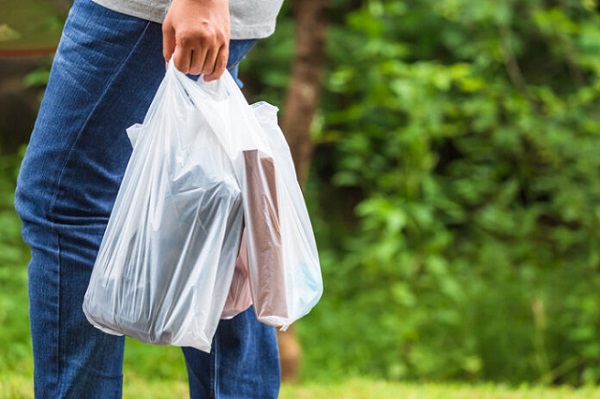Environment
Ottawa’s plastic ban may actually hurt the environment

From the Fraser Institute
” a market research firm, found that in New Jersey… “non-woven polypropylene… consumes over 15 times more plastic and generates more than five times the amount of GHG emissions during production per bag than polyethylene plastic bags.” In other words, the ban helped increase pollution. “
Despite a court ruling late last year, which deemed the Trudeau government ban on single-use plastic (cutlery, straws, grocery bags, etc.) “unreasonable and unconstitutional,” the ban essentially remains in place pending appeal or further regulatory action. But according to the government’s own data and analysis, plastic waste is a virtual non-issue in Canada, as 99 per cent of all plastic waste is disposed of safely in landfills or is incinerated. And less than 1 per cent of Canada’s plastic waste finds its way into the environment.
Moreover, there’s great potential for people to replace banned plastic items, including plastic grocery bags, with other plastic bags not included in the ban such as heavy gauge “reusable” shopping totes and other types of plastic trash bags made of heavier-gauge plastics than the filmy bags banned from grocery stores.
In New Jersey, for example, while plastic grocery bag use did decline following a statewide ban in 2022, plastic substitute materials skyrocketed, plastic consumption rose threefold for heavier reusable bags and sixfold for woven and non-woven polypropylene bags, which are not produced domestically, not recycled nor do they contain recycled content. Freedonia, a market research firm, found that in New Jersey “increased consumption of polypropylene bags” contributed to a “500% increase in greenhouse gas (GHG) emissions compared to non-woven polypropylene bag production” and that “non-woven polypropylene… consumes over 15 times more plastic and generates more than five times the amount of GHG emissions during production per bag than polyethylene plastic bags.” In other words, the ban helped increase pollution.
In California, an environmental interest group called CALPIRG recently issued a report generally favouring plastic bag bans, observing that they do indeed reduce the use of banned bags. However, the report notes that “loopholes,” which allow consumers to use heavier plastic bag alternatives, results in more plastic consumption and waste—not less. According to CALPIRG, plastic bag disposal rates increased in one jurisdiction (Alameda) from 157,000 tons in the year before the ban on single-use grocery bags to 231,000 tons in 2021. On a per-person basis, it rose from 4.1 tons disposed of per 100,000 people to 5.9 tons disposed of per 100,000 over that same span.
In both New Jersey and California, efforts are underway to “fix” the loopholes that have allowed proliferation of plastic consumption and waste in the wake of plastic bag bans. However, these actions are unlikely to work unless they can somehow stop consumers from simply switching to plastic garbage bags or buying online heavier-gauge plastic shopping totes (and trashing them after a few shopping trips). Consumers have already shown they’re prepared to do these things.
Here at home, there’s no reason to believe that Canadian consumers will react any differently to a ban on single-use plastics. Canadians are just as likely to reach for the convenient substitute, whether that’s heavier paper products or heavier plastic products not covered under existing bans.
If sanity reigned, Canada would get ahead of the perverse consequences likely to flow from plastic bans by scrapping the entire idea and allowing consumers to consume what they believe best suits their lives and pocketbooks. Canada already has an admirable waste management system that keeps 99 per cent of disposed plastics safely locked away in environmentally protective landfills or eliminates them completely through incineration.
There’s no need for plastic bans or a governmental takeover of the plastics sector via regulation. Government should throw these bans in the bin.
Author:
Environment
The Myths We’re Told About Climate Change | Michael Shellenberger

Why is it, I asked him, that Bill Gates recently rejected “doomsday” predictions and started calling for a more pragmatic, human-centered approach?
From rising sea levels to surging forest fires to dying polar bears to disappearing coral reefs, much of what we’ve been told about climate change is not true, he says.
The rising sea level narrative, for example, rests entirely on computer models that were manipulated to produce the desired outcome, Shellenberger says.
“It’s clear that the activist scientists were manipulating models to show an acceleration in sea level rise when the only long-term, reliable source of data, which is called tide gauge data…shows no acceleration from the 1850s on,” he says.
How is data cherry-picked or skewed to create misleading narratives? What’s behind the sudden embrace of nuclear energy—after it had been demonized for decades? How might it be related to the global AI race?
Environment
The era of Climate Change Alarmism is over

All over the world, mouths were dropping and eyeballs were popping. Bill Gates has changed his approach to the climate change issue.
This week Gates flipped a switch from funding climate change initiatives, to urging the world’s decision makers to put their attention and their funding towards issues such as fighting poverty and illness.:
Click here to read what Bill Gates said in his own words:
Bill Gates’ is no climate scientist but his about face has brought the issue to the forefront. This could lead to a breakthrough in the way average people approach climate change.
For decades we’ve been told “the science is settled”. Serious scientists don’t make such claims, but the statement has halted millions of conversations that might otherwise have informed. That was the intezntion.
Now that the issue has been opened, it’s a great time to take in this recent interview from the Joe Rogan Experience.
If you have anxiety over climate change or if you know young people who are overwhelmed by concern, this is a must see. If you’re simply someone who simply appreciates the pursuit of knowledge and you’ve never heard from Dr’s Linzen or Happer before, you will be amazed at this conversation.
From the Joe Rogan Experience
Richard Lindzen, PhD, is Professor Emeritus of Earth, Atmospheric, and Planetary Sciences at the Massachusetts Institute of Technology. William Happer, PhD, is Professor Emeritus of Physics at Princeton University. Doctors Lindzen and Happer are recognized for questioning prevailing assumptions about climate change and energy policy.
-

 Business2 days ago
Business2 days agoMark Carney Seeks to Replace Fiscal Watchdog with Loyal Lapdog
-

 COVID-192 days ago
COVID-192 days agoMajor new studies link COVID shots to kidney disease, respiratory problems
-

 Business2 days ago
Business2 days agoP.E.I. Moves to Open IRAC Files, Forcing Land Regulator to Publish Reports After The Bureau’s Investigation
-

 Energy2 days ago
Energy2 days agoCanada’s oilpatch shows strength amid global oil shakeup
-

 International1 day ago
International1 day agoBondi and Patel deliver explosive “Clinton Corruption Files” to Congress
-

 International1 day ago
International1 day agoState Department designates European Antifa groups foreign terror organizations
-

 International1 day ago
International1 day agoIs America drifting toward civil war? Joe Rogan thinks so
-

 Business18 hours ago
Business18 hours agoCarney government needs stronger ‘fiscal anchors’ and greater accountability










